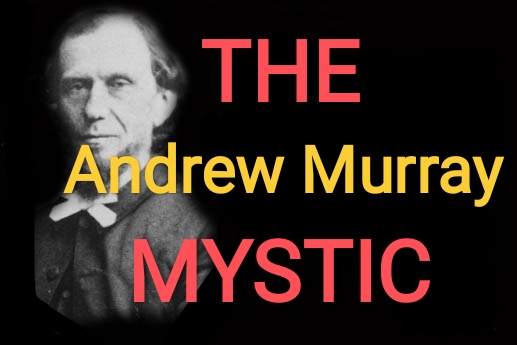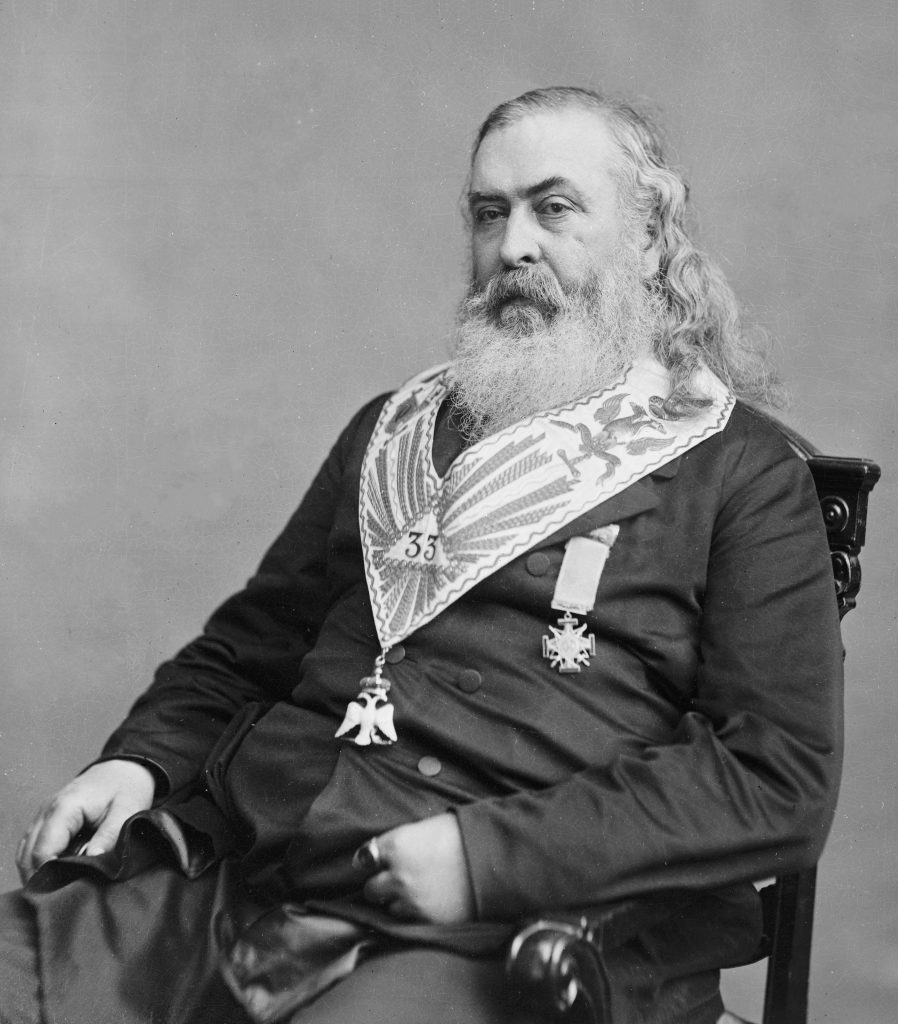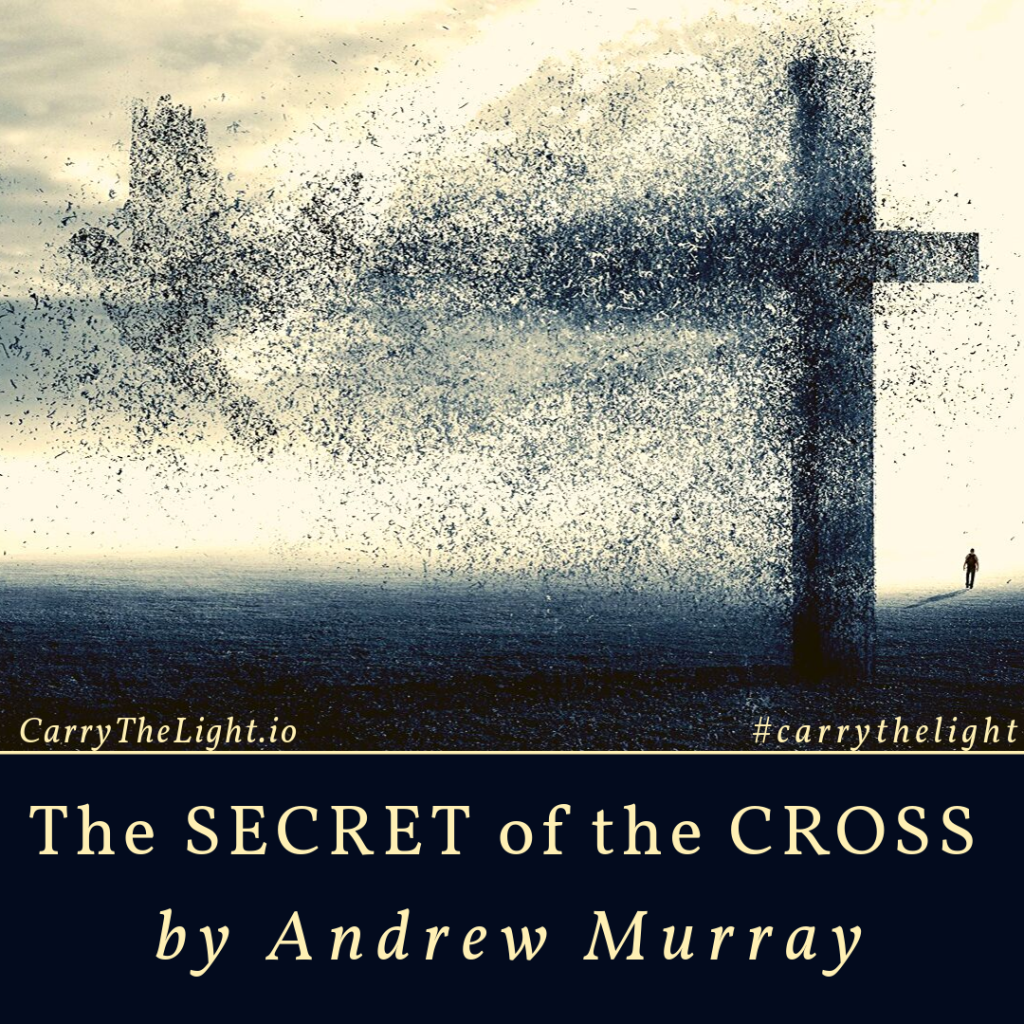ANDREW MURRAY: THE MYSTIC (PART 4)

Andrew Murray’s Secrets
Jesus Christ said, “I spake openly to the world; I ever taught in the synagogue, and in the temple, whither the Jews always resort; and in secret have I said nothing.” (John 18:20).

Albert Pike states,
“Masonry, like all the Religions, all the Mysteries, Hermeticism and Alchemy, conceals its secrets from all except the Adepts and Sages, or the Elect, and uses false explanations and misinterpretations of its symbols to mislead those who deserve only to be misled; to conceal the Truth, which it calls Light from them and to draw them away from it.”[1]
Despite Jesus Christ’s affirmation that He never said things pertaining to his divine mission to earth in secret, Murray attributes secrecy to no less than 12 things associated with Him.

The titles 12 of Murray’s books are mystified by the word “secret.”
- The Secret of Intercession
- The Secret of Inspiration
- The Secret of the Cross
- The Secret of Fellowship
- The Secret of United Prayer
- The Secret of the Throne of Grace
- The Secret of Adoration
- The Secret of Power from on High
- The Secret of the Faith Life
- The Secret of Christ our Life
- The Secret of Brotherly Love
- The Secret of the Abiding Presence
The Merriam- Webster Dictionary defines “secret” as follows,
Adjective: secret —
- kept from knowledge or view: HIDDEN.
- marked by the habit of discretion: CLOSE-MOUTHED.
- working with hidden aims or methods: UNDERCOVER.
- remote from human frequentation or notice: SECLUDED.
- revealed only to the initiated: ESOTERIC.
- designed to elude observation or detection: a secret panel
- something kept hidden or unexplained: MYSTERY.
- something kept from the knowledge of others or shared only confidentially with a few.
- a method, formula, or process used in an art or operation and divulged only to those of one’s own company or craft: TRADE SECRET.
- secrets plural: the practices or knowledge making up the shared discipline or culture of an esoteric society.
- a prayer traditionally said inaudibly by the celebrant just before the preface of the mass.
God’s Word declares:
The secret things belong unto the LORD our God: but those things which are revealed belong unto us and to our children for ever, that we may do all the words of this law. (Deuteronomy 29:29).
There are certain things God alone knows which will only become known when it comes to its final fruition in God’s timing, for instance the rapture of believers and Christ’s Second Advent to the earth.
The realities of these things are revealed but not the time of their actual occurrence.
These things belong to God in the sense that He is the sole Revelator without having to use a chosen vessel or go-between to reveal them as far as timing is concerned.
In close contiguity with this are the things that are hidden for a time according to God’s will but are then revealed through his own chosen vessel/s to reveal them to us and our children.
It is very important to bear in mind that Paul was God’s chosen vessel to preach God’s gospel to the Gentiles.
There are no less than 77 passages in Scripture confirming that God sent Paul to the Gentiles. This is of particular importance for a correct understanding of passages such as Romans 16:25.
Now to him that is of power to stablish you according to my gospel, and the preaching of Jesus Christ, according to the revelation of the mystery, which was kept secret since the world began, (Romans 16:25).
Three things need to be addressed,
- “according to my gospel,
- and “the preaching of Jesus Christ, according to the revelation of the mystery, which was kept secret since the world began,“
- But” now is made manifest, and by the scriptures of the prophets, according to the commandment of the everlasting God, made known to all nations for the obedience of faith:”
From whom was the cross and particularly the blood of a blameless and innocent victim as the only acceptable sacrifice for the remission of sin kept secret or hidden in the Old Testament?
Was it kept secret from God’s chosen people, the Israelites, or the Gentile nations? Paul answers the question in Romans 9.
I say the truth in Christ, I lie not, my conscience also bearing me witness in the Holy Ghost,
That I have great heaviness and continual sorrow in my heart. For I could wish that myself were accursed from Christ for my brethren, my kinsmen according to the flesh:
Who are Israelites; to whom pertaineth the adoption, and the glory, and the covenants, and the giving of the law, and the service of God, and the promises; Whose are the fathers, and of whom as concerning the flesh Christ came, who is over all, God blessed for ever. Amen. (Romans 9:1-5).
The inevitability of the shedding of blood for the remission of sin was revealed to the Israelites through the Torah from the beginning of creation when God rejected Adam and Eve’s self-made redemptive efforts with clothes made of fig leaves and replaced it with animal skins which He Himself slaughtered.
The revelation of the blood-atonement was expanded more profoundly in the book of Leviticus with the institution of the various blood sacrifices, not long after Israel had been delivered from bondage in Egypt, also through an act of blood-atonement.
As Paul wrote in Romans 9, all these things were given to the Israelites and not the Gentiles.
Yes, there are several instances in the Old Testament when Gentiles had been saved, not through any knowledge of the blood-atonement, but purely out of a reverential fear of God’s righteous judgments and his miraculous dealings with Israel’s enemies when they departed from Egypt.
Two examples will suffice. When Rahab the harlot hid two Israeli spies in Jericho, she confessed that it was her reverential fear of God’s judgments in Egypt and on the two kings of the Amorites, Sihon and Og, that convinced her that the God of Israel was the only true God. (Joshua 2:10-11).
Rahab seems to have been one who inspired Jesus to say to the Pharisees, “Verily I say unto you, That the publicans and the harlots go into the kingdom of God before you.” (Matthew 21:31).
However, God’s plan of redemption was gloriously connected to the cross of Christ when He commanded Abraham to sacrifice his son, Isaac, as a burnt offering, and Abraham answered his son in faith when asked, “Behold the fire and the wood: but where is the lamb for a burnt offering?” . . . “My son, God will provide himself a lamb for a burnt offering.” (Hebrews 10:1-7).
May I remind readers that we are dealing with Andrew Murray’s title of one of his books, “The Secret of the Cross.”
It is evident from the examples given above that the cross of Christ in terms of a blood sacrifice for the atonement of sin was not such a deeply hidden secret in ancient times, in terms of it having been revealed to the Israelites.
Moreover, the Old Testament contains some of the most graphic depictions of the cross in Isaiah 53 and Psalm 22.
It bids the question: Why does Paul refer to “his gospel” in Romans 16:25 as the unfolding of a secret kept hidden since the world began?
The recipients of his letter to the saints in Rome provide the answer. Paul’s epistle to the saints in Rome was addressed to both Jews and Gentiles making it a universal gospel for all the nations based on faith and faith alone.
Whereas the shadows of the cross such as the sacrificial system in Leviticus bore ample proof of a coming Messiah who, as God’s Lamb, would be slain for the sins of his people, Paul’s gospel makes it clear that God already had the gentile nations in mind then, although it had been kept secret in the scriptures of the prophets (verse 26).
Paul makes the secret known in Romans 4 when he extolls God’s salvific mercy through faith alone and not through any Mosaic law.
Blessed are they whose iniquities are forgiven, and whose sins are covered. Blessed is the man to whom the Lord will not impute sin. Cometh this blessedness then upon the circumcision only, or upon the uncircumcision also? for we say that faith was reckoned to Abraham for righteousness. How was it then reckoned? when he was in circumcision, or in uncircumcision? Not in circumcision, but in uncircumcision. And he received the sign of circumcision, a seal of the righteousness of the faith which he had yet being uncircumcised: that he might be the father of all them that believe, though they be not circumcised; that righteousness might be imputed unto them also:And the father of circumcision to them who are not of the circumcision only, but who also walk in the steps of that faith of our father Abraham, which he had being yet uncircumcised. (Romans 4:7-12).
The secret of the cross and its fullness of salvation for both Jews and Gentiles were no longer a secret.
Consequently, anything Murray mentions in his book “The Secret of the Cross” being a hidden secret and him being the revelator (a specially gifted mystic to reveal secrets), cannot be trusted.
I am not submitting that everything Murray wrote in his book is untrustworthy. In fact, for the most part it is biblically sound. It becomes rather offbeat when he stealthily introduces his Calvinistic proclivity.
Why does Murray call the cross a secret when Paul has already disclosed the secret? Wikipedia writes,
Calvin’s doctrine of providence is straightforward. “All events whatsoever are governed by the secret counsel of God.” Therefore, “nothing happens but what [God] has knowingly and willingly decreed.” This excludes “fortune and chance.”[16] Calvin applied his doctrine of providence concerning “all events” to individuals and their salvation in his doctrine of predestination.
Calvin opened his exposition of predestination with an “actual fact”. The “actual fact” that Calvin observed was that even among those to whom “the covenant of life” is preached, it does not gain the same acceptance.[17] Although, “all are called to repentance and faith”, in fact, “the spirit of repentance and faith is not given to all”.[18]
Andrew Murray makes an unfortunate distinction between “justification” and “regeneration.”
He admits that faith alone is required for both but contends that justification by faith is insufficient, and that a subsequent regeneration (quickening to a new life) of a person is necessary to complete the cycle of redemption, and to bring to fruition a genuine faith and redemption.
If justification itself is not enough, then the faith required for justification cannot be enough as well, causing it to be inadequate/insufficient, which, according to Holy Writ, cannot please God. (Hebrews 11:6). It debunks Andrew Murray’s statement,
“In chapter iv., he points to Abraham as having, when he believed, understood that God justified him freely by His grace, and not for anything that he had done.
Abraham had not only believed this, but something more. “He believed in God, Who guickeneth the dead, and calleth the things that are not, as though they were.”
The two expressions are most significant, as indicating the two essential needs there are in the redemption of man in Christ Jesus.
There is the need of justification by faith, to restore man to the favour of God. But there is more needed. He must also be quickened to a new life. Just as justification is by faith alone, so is regeneration also.
Christ died for our sins; He was raised again out of, or through our justification.”[2]
The words “He was raised again out of, or through our justification” appear in no known Bible translation. Zilch!
As a matter of interest an Internet Google search proves that Andrew Murray was the only one who used these words in the order they appear in his book, “The Secret of the Cross.”
The only possible reference to his usage of these words can be traced to Romans 4:25,
“And being fully persuaded that, what he had promised, he was able also to perform. And therefore it was imputed to him for righteousness. Now it was not written for his sake alone, that it was imputed to him; But for us also, to whom it shall be imputed, if we believe on him that raised up Jesus our Lord from the dead; Who was delivered for our offences, and was raised again for our justification.” (Rom 4:21-25).
Please note the difference between Murray and the Bible. Whereas Murray says “through our justification” God categorically and distinctly says “FOR our justification.” Also please remember what God says about the sin of adding or taking away from His Word. (Revelation 22:18-19).
There is no hint whatsoever in Romans 4:21-25 that the justification unto righteousness of all those who believe that Jesus died for their sins, duly accomplished, ratified, and demonstrated by his resurrection, is not enough and that more (regeneration by faith) is needed.
The only way to explain such a two-faith doctrine of an inadequate, insufficient justification and a subsequent adequate, sufficient regeneration is to examine it in the framework of Calvinism.
The inadequate faith expressed in justification, which allegedly restores man only to the favour of God, hints at man’s complete inability to believe the Gospel and be saved.
Only when God sovereignly and monergistically regenerates the elect and enables him to believe (grants him/her the gift of faith after a monergistic regeneration), the elect is quickened to a new life.
Ironically, Andrew Murray’s book, “In Search of God’s Perfection” contradicts his opinion that God’s justification of sinners by faith is inadequate and that something more is needed.
Whilst he extolls God’s perfection and man’s ability to reach perfection,[3] he denies God’s ability to justify sinners perfectly because “there is more needed.” The Amplified Bible translates Romans 8:33 thus,
Who will bring any charge against God’s elect (His chosen ones)? It is God who justifies us [declaring us blameless and putting us in a right relationship with Himself].
Not even God can lay charges against genuinely saved Christians simply because his imputed justification, by their faith, is perfect and far from being inadequate, insufficient, or implies that “there is more needed” to fulfil the alleged vacuum in justification.
Justification by faith and regeneration by faith is one the same thing and happens instantaneously at the same time.
There is no timeline between the divine act of justification and regeneration. Sadly, Andrew Murray lays a charge against God by implying that God’s justification by faith is inadequate, insufficient and lacks perfection.
One of the most perplexing mysteries about Andrew Murray is that he was able to masterfully explain biblical doctrine in his books (excluding his doctrine on divine healing) and yet sustain a mystical aura that, as a system of pious religiosity, dispenses with sound doctrine.
One of the best examples that illustrates this mysterious phenomenon is his quote from Thomas à Kempis’ book “The Imitation of Christ” in the foreword to his own book, “The Secret of the Cross.”

“JESUS hath now many lovers of His heavenly kingdom, but few bearers of His Cross.
He hath many desirous of consolation, but few of tribulation.
He findeth many companions of His table, but few of His abstinence.
All desire to rejoice with Him, few are willing to endure anything for Him, or with Him.
Many follow Jesus unto the breaking of bread, but few to the drinking of the Cup of His Passion.
Many reverence His miracles, few follow the ignominy of His Cross.”
THOMAS À KEMPIS.
The secret of Murray’s cross begins to unveil itself when we ask ourselves a few questions.
Why does he quote from a book that is thoroughly Roman Catholic of whom the author, Thomas à Kempis, venerated Mother Mary and believed in the real presence of Christ in the Eucharist?
Despite their doctrinal differences, “The Imitation of Christ” is highly esteemed among both Protestants and Catholics. Jacques-Bénigne Bossuet called it the fifth Gospel and Abbot Oliver hailed it as “the finest book that has emerged from human hands, just as the Gospel came from the hands of God.”
Whoa! This is dangerous – extremely dangerous, as we shall see in the next edition of this series. Part 5, “Andrew Murray’s imitation of Thomas à Kempis who imitated Mother Mary.”
[1] Pike, Albert, Morals and Dogma of the Ancient and Accepted Scottish Rite of Freemasonry, pp 104-105
[2] Andrew Murray, “The Secret of the Cross”, pp. 34-35
[3] Perfection is possible and attainable. To know perfection, we must accept God’s commands and obey them. Perfection is not an arbitrary Command; the nature of God can ask for nothing less. Perfection is the highest aim of what God, in His great power, can do for us. Perfection is not some intangible level of existence that sounds good in theory but is impossible to achieve in real life. Perfection is not only obtainable, but it should be our goal as believers. God has made divine provision for each of us to become perfect.